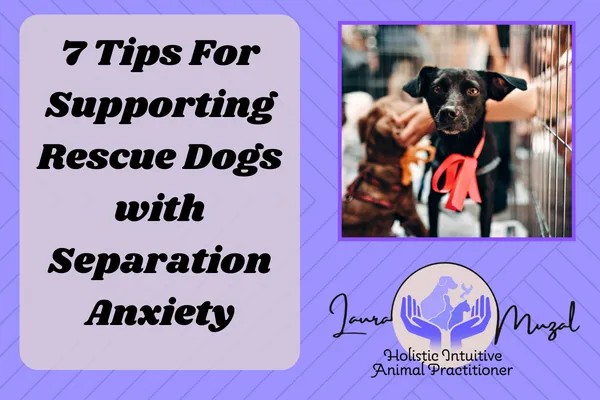Pawsitively Holistic: Your Guide to Pet Wellness

7 Tips on Supporting Rescue Dog with Separation Anxiety

7 Tips on Supporting Rescue Dog with Separation Anxiety
Separation anxiety in rescue dogs is a common challenge faced by many adopters. Their previous experiences before finding their forever home can have a profound impact on their emotional well-being. While rescue dogs can experience separation anxiety similar to other dogs, there are unique factors that set them apart. In this article, we will explore the causes of this anxiety, how to identify if your dog is affected, and ways to provide comfort even in your absence. By gaining a deeper understanding of separation anxiety and learning how to support your rescue dog, you can create a happy and secure home where your new companion can relax, assured of the caring environment they are in.
Factors Influencing Separation Anxiety in Rescue Dogs
Although rescue dogs can experience separation anxiety similar to other dogs, there are distinct factors that differentiate separation anxiety in rescue dogs.
Previous Trauma: Many rescue dogs have faced challenging or traumatic situations before adoption, leading to heightened anxiety, including separation anxiety. They may fear abandonment and struggle with trust due to their past experiences.
Change in Environment: Rescue dogs often undergo significant changes, transitioning from shelters to new homes. These shifts can worsen separation anxiety as they grapple with unfamiliar surroundings and new caregivers.
Attachment Issues: Inconsistent or disrupted relationships with previous owners can impair a rescue dog's ability to form secure attachments. Consequently, they may experience increased anxiety when separated from their new caregivers.
Uncertain Past: Some rescue dogs have unknown histories, making it difficult to pinpoint triggers or understand the root causes of their anxiety. The mystery surrounding their past adds complexity to managing their separation anxiety.
Individual Differences: Similar to other dogs, each rescue dog is unique, and their response to separation anxiety varies based on their personality, past experiences, and overall temperament. These differences underscore the need for personalized approaches to address their anxiety.
Despite these potential distinctions, the fundamental principles of addressing and managing separation anxiety in rescue dogs remain similar to those for any other dog.
What Can You Do to Ease Rescue Dog Separation Anxiety?
Initiate a Call to Your Veterinarian
Several symptoms suggesting separation anxiety in dogs and cats might actually point to an underlying health problem. Since your pet can't express their feelings by saying, "I hate it when you leave!" nor communicate when they're unwell, it's crucial to consult your vet. The vet will check for specific health conditions that might be causing changes in your pet's behavior. Once your pet receives a clean bill of health, you can then start alleviating your beloved companion's worries.
Keeping Destructive Pets Busy and Entertained
Exercise your pet regularly when you are at home, or hire a walker if you are unable to do so. Make time for a laser pointer workout in the morning, or throw the ball a few extra times to help your pet get some energy out. This extra quality time with you will also help fill the void of the rest of the day. Leave them with lots of toys and things to fulfill their curiosity, and keep their claws and teeth off of your drywall.
Consider Using Calming a Device or Treatment
I have found Thundershirts to be incredibly effective in soothing anxious animals. Originally created to comfort pets during thunderstorms, their snug fit replicates the sensation of being hugged.

Another option to consider is Pets PEMF Pad, specifically designed to calm dogs experiencing separation anxiety. PEMF, or Pulsed Electromagnetic Field therapy, is gaining popularity as a non-invasive treatment for various health issues, including anxiety, in both humans and pets. When used for pets with anxiety, PEMF devices emit electromagnetic pulses that can potentially stimulate cellular activity and promote relaxation, potentially aiding in reducing anxiety levels.
If you're looking for free ways to ease your pet's anxiety - you might consider energy healing videos on YouTube. My channel Subliminal Pet Healing offers specialized videos dedicated to calming anxious pets, including those dealing with separation anxiety.
Systematic desensitization
Systematic desensitization is a method used to help animals, or people, gradually overcome fear or stress by controlled exposure to the source of their anxiety. For pets struggling with prolonged periods of solitude, this technique can be particularly helpful. Start by leaving your pet alone for short durations, then gradually extend the time. Consider employing a dog-walker temporarily to assist. Vary your weekend activities, preventing your pet from becoming overly accustomed to constant company. This way, they won't feel neglected when you resume your regular routine come Monday, and the effort invested can yield significant results in the long run.
Don’t make a big deal out of it!
Minimize prolonged, emotional farewells in the morning with your pet. If they detect your distress, it can heighten their anxiety. Similarly, maintain a calm demeanor when you return in the evening. Offer affectionate greetings and praise for good behavior, but avoid excessive excitement. Staying neutral during departures and arrivals can help your pet remain composed too.
Calming supplements or essential oils
Create a calming atmosphere for your pet by diffusing a soothing blend of lavender and frankincense. Use a diffuser or lightly spray the mixture in areas where your pet spends the most time.
Consider using CBD oils and treats, specifically formulated for dogs and cats, to alleviate anxiety. These pet-friendly products contain minimal to zero THC, ensuring no psychoactive effects on your furry friend. Recent studies have demonstrated the significant stress-reducing effects of CBD, especially during separation, with minimal side effects. Personally, I have witnessed the remarkable benefits of CBD for my own pets and patients, making it one of the most effective solutions for easing separation anxiety. However, always consult a professional before introducing any supplements or essential oils to your pet's routine.
Consult with a Professional

If you discover that these methods aren't easing your dog's separation anxiety, it's a clear indicator that professional assistance is necessary. As a Certified Holistic Pet Health Coach and Intuitive Animal Practitioner, I specialize in understanding your furry companion's individual needs.
I'll collaborate closely with you to pinpoint the underlying cause of your pet's distress. Through personalized guidance and energy healing techniques, I offer tailored solutions to alleviate your pet's separation anxiety effectively.
Assisting a rescue dog in overcoming separation anxiety requires understanding, compassion, and a tailored approach. While the unique circumstances of rescue dogs may present challenges, the fundamental strategies for managing separation anxiety remain unchanged. By employing techniques like gradual desensitization, providing mental and physical stimulation, and seeking professional guidance as necessary, you can help your rescue dog feel more secure and at ease, even in your absence.
Your dedication to supporting your rescue dog through this process not only improves their well-being but also deepens the bond you share. With time, patience, and a willingness to learn, you can create a nurturing and affectionate home where your rescue dog can thrive, finding solace in your love and care.
FAQ on Managing Rescue Dog Separation Anxiety
Is it possible to address separation anxiety in pets?
Certainly, training methods and specific techniques can be employed to manage and diminish separation anxiety.
What are typical indicators of separation anxiety?
Common signs encompass excessive barking, destructive behavior, pacing, and house soiling.
How long does it typically take for a pet to recover from separation anxiety?
The recovery period for pets dealing with separation anxiety varies widely. It might span from weeks to months, contingent on the severity of the condition, the effectiveness of training, and individual factors. Consistent training methods and professional guidance can significantly expedite the progress.
Have More Questions or Need Personalized Pet Care Advice?
If you have additional questions or need personalized guidance for your beloved pet, I'm here to help. Book a call with me, and let's discuss how to best care for your furry friend. Your pet's well-being is my priority, and I'm dedicated to providing the support and expertise you need. Click here to schedule your consultation today. Together, we can ensure your pet leads a happy, healthy life.
Affiliate Disclosure: Some of the links on this blog are affiliate links. If you make a purchase through these links, the blog owner may earn a commission at no extra cost to you.

